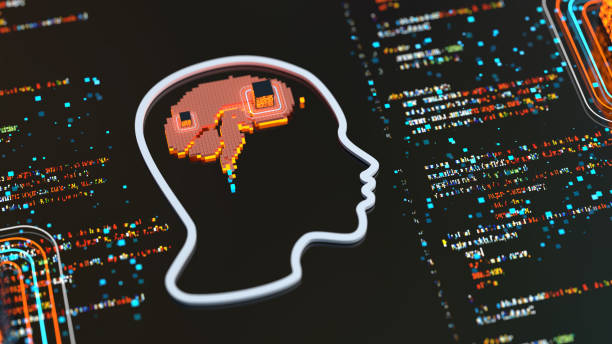What is Artificial Intelligence and What are its Applications?

#Artificial_Intelligence (AI) refers to a branch of computer science dedicated to building machines capable of performing tasks that typically require human intelligence.
These tasks include learning, problem-solving, pattern recognition, language understanding, and decision-making.
The primary goal of AI is to create systems that can operate autonomously and intelligently, without the need for direct human intervention.
AI is rapidly advancing and has found extensive applications in various fields such as medicine, transportation, finance, education, and entertainment.
This technology can help improve efficiency, increase accuracy, and reduce costs.
The applications of artificial intelligence are highly diverse.
In medicine, AI can assist in diagnosing diseases, developing drugs, and providing personalized treatments.
In the automotive industry, AI plays a crucial role in the development of self-driving cars.
In manufacturing, AI can help optimize processes, reduce errors, and increase productivity.
Additionally, AI has numerous applications in areas such as customer service, marketing, and security.
Given the rapid advancements in this field, AI is expected to play an even more significant role in our lives in the future.
Are you tired of your company’s website failing to meet your expectations? With Rasaweb, design a professional website that truly represents your business.
✅ Increase the acquisition of new customers and sales leads
✅ Enhance your brand’s credibility and trust among your audience
⚡ Get a free website design consultation!
Types of Artificial Intelligence: A Closer Look

Artificial intelligence can be divided into two main categories: Narrow AI and General AI.
Narrow AI is designed to perform a specific task and excels in that particular domain.
Examples of Narrow AI include voice assistants like Siri and Alexa, movie and music recommendation systems, and facial recognition software.
These systems are only capable of performing the task they were programmed for and cannot operate outside that scope.
General AI, also known as Artificial General Intelligence (AGI), refers to a system capable of learning and performing any task a human can.
This type of AI is still in its early stages of development and has not yet been fully realized.
The main goal in developing General AI is to create machines with human-like intelligence and consciousness that can think and make decisions independently.
Achieving this goal could have profound impacts on society and technology.
Machine Learning and its Role in Artificial Intelligence
![]()
Machine Learning (ML) is a crucial subfield of #Artificial_Intelligence that enables machines to learn from data and improve their performance without explicit programming.
Essentially, instead of giving machines precise instructions, we allow them to discover patterns and relationships by analyzing data and make decisions based on them.
This process involves training mathematical models using large datasets so that the model can provide accurate predictions and decisions.
There are various methods for machine learning, including Supervised Learning, Unsupervised Learning, and Reinforcement Learning.
In supervised learning, the model is trained using labeled data, while in unsupervised learning, the model must automatically discover patterns from unlabeled data.
Reinforcement learning allows machines to improve their behavior by interacting with the environment and receiving rewards and penalties.
Machine learning plays a very important role in developing AI applications and is used in various fields such as image recognition, natural language processing, and data analysis.
| Type of Machine Learning | Description | Examples |
|---|---|---|
| Supervised Learning | The model is trained using labeled data. | Spam email detection, stock price prediction |
| Unsupervised Learning | The model discovers patterns from unlabeled data. | Customer clustering, data dimensionality reduction |
| Reinforcement Learning | The model improves its behavior by interacting with the environment and receiving rewards and penalties. | Video games, robot control |
Natural Language Processing: A Bridge Between Humans and Machines

Natural Language Processing (NLP) is another crucial branch of artificial intelligence that enables machines to understand and process human language.
This technology includes text analysis, language translation, question answering, text generation, and text summarization.
The primary goal of NLP is to create systems that can communicate with humans in natural language and meet their needs.
NLP has widespread applications in various fields such as customer service, information retrieval, sentiment analysis, and content creation.
Recent advancements in NLP, especially with the use of large language models like GPT-3 and BERT, have led to significant improvements in the performance of natural language processing systems.
These models are trained using very large datasets and are capable of understanding and generating highly complex texts.
NLP plays a very important role in the development of voice assistants, chatbots, and translation systems, enabling machines to communicate more effectively with humans.
Are you dissatisfied with the low conversion rate of visitors to customers on your e-commerce site?
Solve this problem permanently with professional e-commerce website design by Rasaweb!
✅ Increase visitor-to-customer conversion rates
✅ Create an excellent user experience and build customer trust
⚡ Get a free consultation
The Future of Artificial Intelligence: Opportunities and Challenges

The future of artificial intelligence is full of exciting opportunities and challenges.
Rapid advancements in this field can lead to improved quality of life, increased productivity, and the solution of complex problems.
However, AI also brings challenges, including ethical issues, security concerns, and social and economic impacts.
To fully capitalize on the opportunities of AI and mitigate its risks, it is essential that the development of this technology is carried out carefully and responsibly.
One of the main challenges in the field of artificial intelligence is ethical issues.
Decisions made by AI systems can have significant impacts on people’s lives, and it must be ensured that these decisions are fair and just.
Also, security concerns are very important.
AI systems can be targeted by cyberattacks and used for malicious purposes.
Furthermore, the social and economic impacts of AI must also be considered.
Automation and AI can lead to job losses, and it is necessary to adopt appropriate policies to address this issue.
The Impact of Artificial Intelligence on Various Industries

#Artificial_Intelligence has had a profound impact on various industries and is changing how we work and live.
In medicine, AI can assist in diagnosing diseases, developing drugs, and providing personalized treatments.
In the automotive industry, AI plays a crucial role in the development of self-driving cars.
In manufacturing, AI can help optimize processes, reduce errors, and increase productivity.
Additionally, AI has numerous applications in areas such as customer service, marketing, and security.
In the financial industry, AI can help detect fraud, manage risk, and provide personalized financial services.
In education, AI can assist in providing personalized learning, assessing student performance, and providing immediate feedback.
In entertainment, AI can help generate creative content, recommend movies and music, and provide interactive experiences.
Given the rapid advancements in this field, AI is expected to play an even more significant role in various industries in the future, leading to major transformations in the economy and society.
How to Learn Artificial Intelligence?

Learning #Artificial_Intelligence can be a challenging but very rewarding process.
To start, you can familiarize yourself with the basic concepts and fundamental principles of AI.
Many online resources are available to help you in this area, including online courses, articles, and books.
Also, participating in workshops and conferences related to AI can help you connect with experts in the field and learn from their experiences.
One of the best ways to learn AI is by undertaking practical projects.
By doing small and simple projects, you can practically understand theoretical concepts and strengthen your skills.
Also, participating in open-source projects and collaborating with other developers can help you gain more experience and face real challenges.
To learn AI, it is necessary to be familiar with programming languages such as Python and related libraries such as TensorFlow and PyTorch.
These tools enable you to design, train, and implement AI models.
| Learning Resource | Description | Link |
|---|---|---|
| Coursera | Online courses in the field of Artificial Intelligence | Coursera |
| edX | Online courses from top universities | edX |
| AI Books | Comprehensive resources for learning theoretical concepts | Search on Google Books |
| TensorFlow | Open-source library for machine learning | TensorFlow |
| PyTorch | Open-source library for deep learning | PyTorch |
The Role of Data in Artificial Intelligence Development

Data plays a very important role in the development of #Artificial_Intelligence.
AI systems require large and diverse datasets to learn and improve their performance.
The more data we have, the more complex patterns and relationships AI systems can discover, and the more accurate predictions they can provide.
In fact, data acts as fuel for AI systems, and without it, these systems cannot function effectively.
Collecting, preparing, and managing data are among the important challenges in AI development.
Data must be accurate, complete, and error-free so that AI systems can use it correctly.
Also, data needs to be updated regularly so that AI systems can adapt to environmental changes.
In addition, issues related to data privacy and security must also be considered.
For using data in AI development, appropriate laws and regulations must be put in place to protect individuals’ privacy and prevent data misuse.
Does your company’s website create a professional and lasting first impression on potential customers? Rasaweb, with its professional corporate website design, not only showcases your brand’s credibility but also paves the way for your business growth.
✅ Create a powerful and trustworthy brand image
✅ Attract target customers and increase sales
⚡ Get a free consultation
Current Limitations of Artificial Intelligence

Despite significant advancements in the field of #Artificial_Intelligence, this technology still has limitations that must be addressed.
One of the main limitations of AI is its inability to understand and reason like humans.
AI systems are usually designed to perform specific tasks and cannot operate outside that scope.
Also, AI still cannot fully understand human emotions and use them in its decision-making.
Another limitation of AI is its dependence on data.
AI systems require large and diverse datasets to learn and improve their performance, and if sufficient data is not available, their performance may be poor.
In addition, AI may be vulnerable to noisy and inappropriate data and may not be able to use it correctly.
Also, issues related to the ethics and security of AI are among the important limitations of this technology.
To use AI responsibly, these limitations must be considered, and efforts must be made to overcome them.
Artificial Intelligence and the Future of Humanity

#Artificial_Intelligence can have profound effects on the future of humanity.
This technology can help improve the quality of life, increase productivity, and solve complex problems.
However, AI also brings challenges, including ethical issues, security concerns, and social and economic impacts.
To fully capitalize on the opportunities of AI and mitigate its risks, it is essential that the development of this technology is carried out carefully and responsibly.
One of the positive impacts of AI can be increased productivity and reduced costs.
AI systems can automatically perform repetitive and tedious tasks, allowing humans to focus on more creative and important work.
Also, AI can help solve complex problems and provide innovative solutions.
However, it is necessary to pay attention to the social and economic impacts of AI and adopt appropriate policies to address job losses and rising inequality.
Also, issues related to the ethics and security of AI must be considered to prevent the misuse of this technology.
Frequently Asked Questions
| Question | Answer |
|---|---|
| 1. What is Artificial Intelligence (AI)? | It is a branch of computer science that aims to create machines capable of simulating human intelligence and performing tasks that require human thinking, such as learning, problem-solving, and decision-making. |
| 2. What are the main types of Artificial Intelligence? | It can be classified into Narrow AI, which focuses on a specific task, General AI, which possesses comprehensive human-like capabilities, and Super AI, which surpasses human intelligence. |
| 3. Mention some common applications of Artificial Intelligence in our daily lives. | These include voice assistants (like Siri and Alexa), recommendation systems (like Netflix and Amazon), self-driving cars, facial recognition systems, and spam filters. |
| 4. What is the difference between Artificial Intelligence and Machine Learning? | Artificial intelligence is the broader concept of creating intelligent machines, while machine learning is a subset of artificial intelligence that focuses on enabling systems to learn from data without explicit programming. |
| 5. What is Deep Learning? | It is a subset of machine learning that uses multi-layered artificial neural networks (deep neural networks) to process data and discover complex patterns, and is used in image and speech recognition. |
| 6. What are the most prominent benefits of Artificial Intelligence? | Improving efficiency and productivity, automating repetitive tasks, making better decisions based on big data analysis, and developing solutions for complex problems in fields such as medicine and science. |
| 7. What are the main challenges facing the development and deployment of Artificial Intelligence? | These include the need for vast amounts of high-quality data, privacy and security issues, bias in data and algorithms, and high development and maintenance costs. |
| 8. Does Artificial Intelligence raise ethical or social concerns? | Yes, it raises concerns related to privacy, algorithmic bias, job displacement due to automation, responsibility for errors made by intelligent systems, and the need for a regulatory framework. |
| 9. How can Artificial Intelligence affect the future of the job market? | It can lead to the automation of some routine jobs, but it will also create new jobs requiring advanced skills in developing, operating, and maintaining AI systems. |
| 10. What are some modern or promising technologies in the field of Artificial Intelligence? | These include advanced Natural Language Processing (NLP) (such as large language models like ChatGPT), computer vision, robotics, and Generative AI. |
And other advertising agency services from Rasa Web in the field of advertising
- Smart Marketplace: An effective tool for increasing sales with the help of real data.
- Smart Data Analysis: A professional solution for digital branding focusing on smart data analysis.
- Smart Brand Identity: Professional optimization for online growth using Google ad management.
- Smart Digital Advertising: A combination of creativity and technology for analyzing customer behavior through custom programming.
- Smart SEO: A specialized service for increasing website traffic based on smart data analysis.
And over hundreds of other services in the field of internet advertising, advertising consulting, and organizational solutions
Internet Advertising | Advertising Strategy | Advertorial
References
Artificial Intelligence on Digiato
Artificial Intelligence News on ISNA
Artificial Intelligence on Farsi Wikipedia
Artificial Intelligence Articles on Zoomit
? Transform your business’s online presence with Rasaweb Afarin Digital Marketing Agency. From professional e-commerce website design to comprehensive digital strategies, we are your guide to success in the online world.
📍 Tehran, Mirdamad Street, next to the Central Bank, South Kazeroon Alley, Ramin Alley, No. 6




